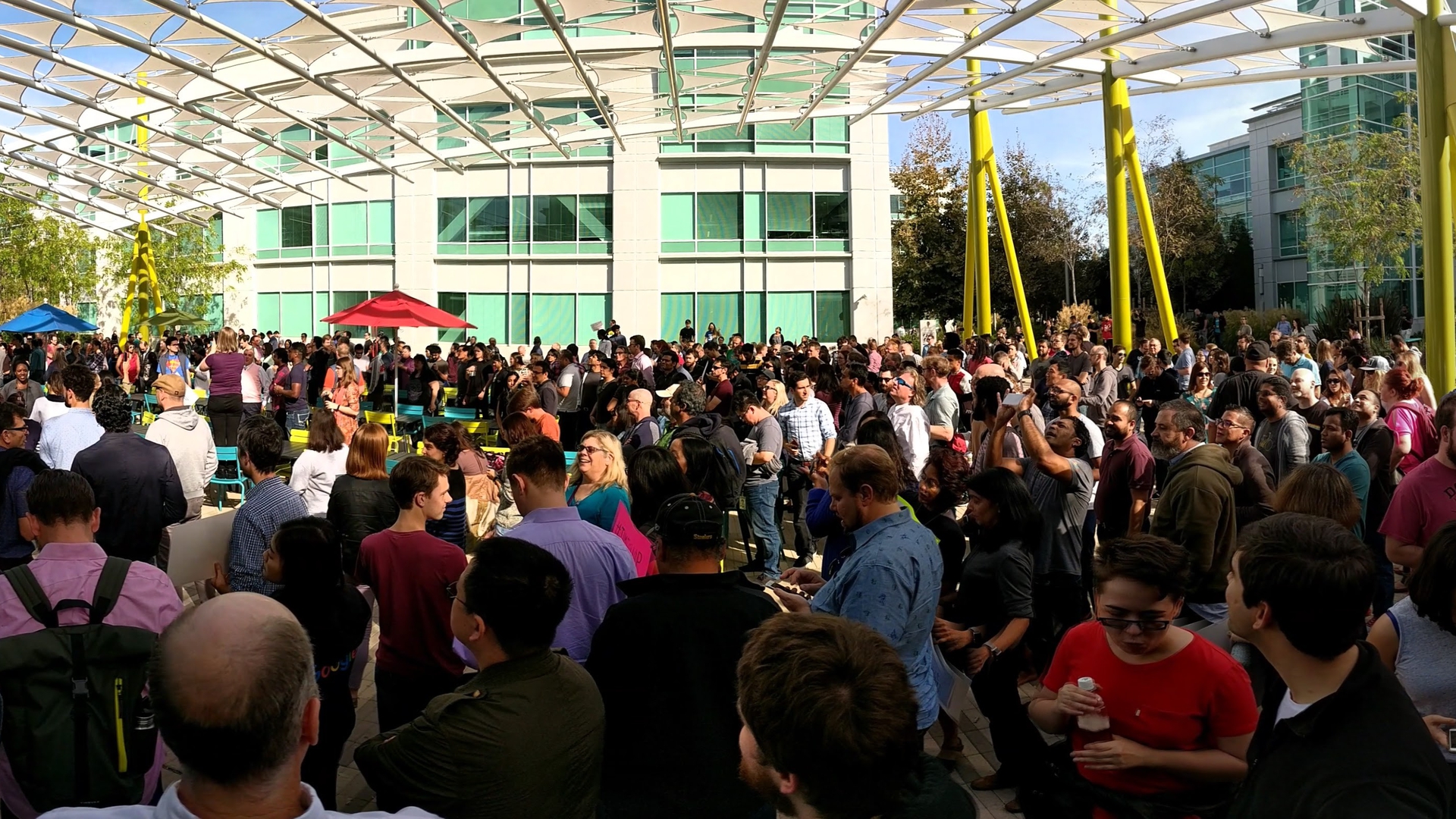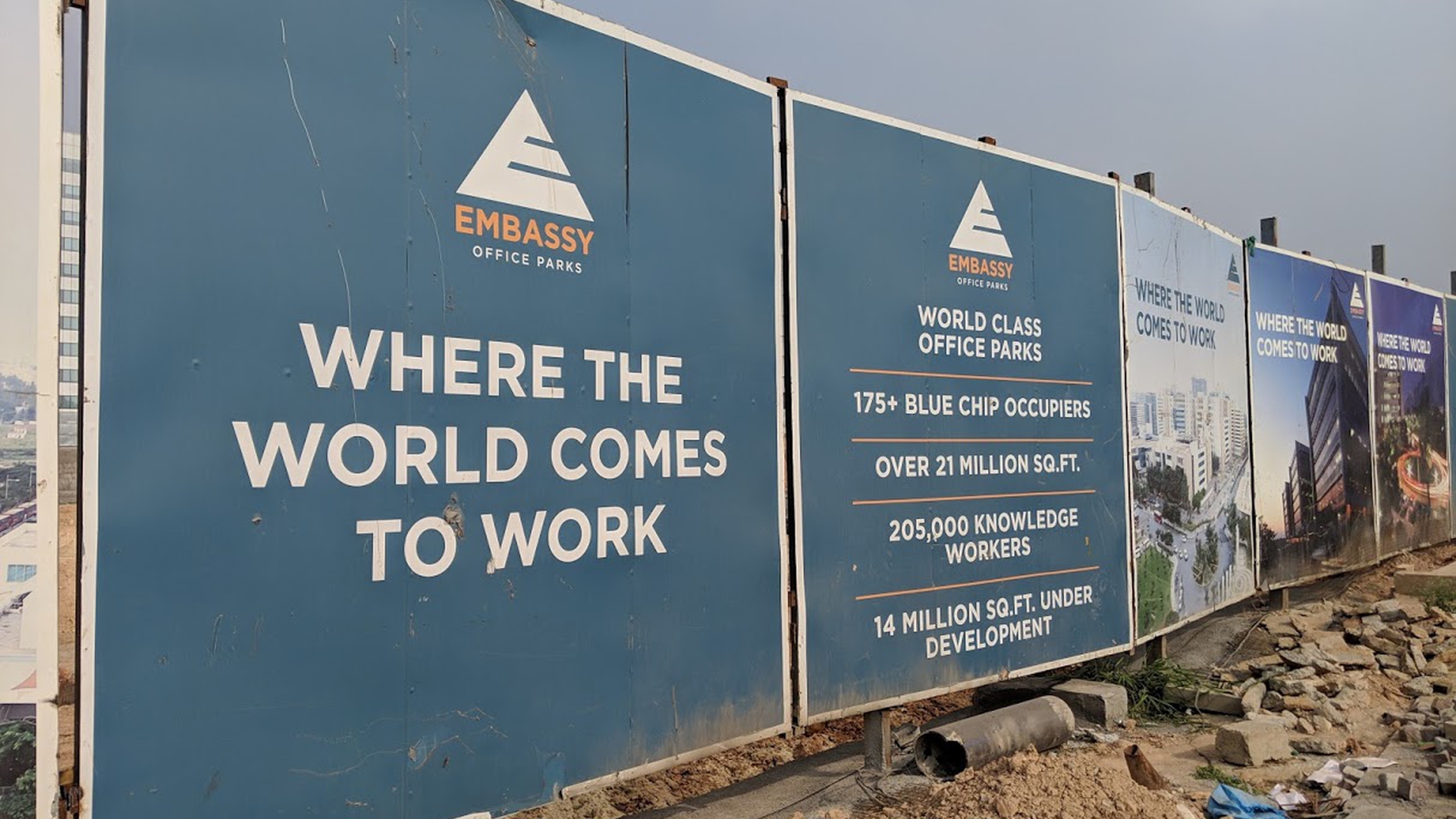Looking Back

inquiry
Looking Back
by
R.K. Upadhya
/
June 8, 2019
in
Logout!
(#8)
Tech Worker Mobilizations in 2018
In March 2018, I gave a presentation at the Log Out symposium on the perspective of some members of Tech Workers Coalition (TWC) on conditions among white-collar workers in the tech industry, and prospects for organizing. An incredible amount has happened since then, and so it is worth engaging in a retrospective on the presentation.
Back in March, we offered a framework of categorizing tech worker grievances into roughly three different types. The first was “standard workplace issues”, referring to the kinds of grievances that are traditional causes of labor unrest, like wages and benefits. The second was “social composition issues”, referring to the prevalence of racism, sexism, and other forms of discrimination in the workplace. The third was “ethical and political issues”, referring to both the political allegiances of corporate executives, as well as the production of unethical and oppressive technologies.
All three of these grievance areas have entered into mainstream consciousness in the past year, with increasingly visible and militant actions being taken by tech workers across the industry. Organizing has been especially visible at Google, where all three issue areas have been taken up by public campaigns that made headlines all over the world.
A work boycott in early 2018 by key engineering personnel shut down efforts to develop an “air gap” security feature that would have enabled the company to pursue work with the military on classified projects. This was one of the catalysts for a wider effort among workers to push back against Google’s foray into military technologies. These efforts won huge victories, first in shutting down the renewal of Project Maven, a contract with the Department of Defense to develop artificial intelligence tools for military drones; and then in forcing Google to back out of bidding on the massive $10 billion Joint Enterprise Defense Infrastructure (JEDI) project, a contract to build the US military a new cloud-computing platform. Worker organization and mobilization also forced Google to scale back on Project Dragonfly, a censored search engine that was being built for China.
Shortly after the major victories against Google’s efforts to back the US military, workers staged a massive display of solidarity against the company’s dealings with sexual misconduct, with some 20,000 workers across the globe participating in a walk-out. The action was a protest against revelations that the company had routinely covered up sexual misconduct by various executives, who were then given millions in compensation to leave. Five demands were put forward, all concerning issues of sexism and gender disparity. The first demand, an end to forced arbitration in harassment and abuse cases, was partially met - but notably, only for full-time workers.
This has sparked yet another movement at Google, this one around the massive disparities between full-time employees and contract workers. These disparities are not just in legal rights like forced arbitration, but also in basic economic issues like wages and benefits. Roughly half of Google’s workers are contract workers - a trend that is generalizable to the tech industry in general – and despite many of them doing more or less the same type of work as full-time workers, they recieve drastically less wages and few, if any benefits.
The protracted and escalating organizing that is taking place at Google is also having spillover effects on the rest of the tech industry, particularly at the other major firms. After the success against Project Maven and the JEDI contract, workers at Amazon, Microsoft, and Salesforce all launched internal campaigns against certain products and contracts that supported various institutions of imperialism. Amazon workers protested against the AI-driven facial recognition product Rekognition, which is being marketed toward US law enforcement; and Microsoft and Salesforce workers protested against providing US immigration and border enforcement divisions with business process and cloud computing software. It is striking that the most visible industry-wide movement thus far has been against various nodes of imperialism.
Thus far, organizing at these other companies has not yielded the kind of public presence or successes that has been seen at Google; part of this difference likely has to do with the differences in company culture and how that can facilitate (or not) the “invisible organization” that can emerge among workers. Amazon and Microsoft, in particular, have a more traditionally authoritarian workplace governance system, unlike the relatively more free-wheeling and counter-cultural Google. The latter’s traditions, while not intended to allow workers to organize, can nonetheless be seized upon and exploited to spread dissent and build out networks outside the control of management. It must be emphasized, however, that regardless of the relative openness espoused by a company, there are still serious risks involved in organizing, and retaliation will be a constant threat. In fact, Google is already moving to restrict the ability of workers to communicate with one another.
Aside from these headline-grabbing campaigns, there are also countless local stories of struggles – some successful, some not – continuing to take place every day in smaller companies, departments, and offices. These stories typically won’t make the news; but they are nonetheless crucial moments of class struggle where workers are facing off against bosses and the larger economic pressures of capitalism, and in the process, gaining experience and confidence as militant workers, agitators, and organizers.
One case of this, echoing the mobilizations at Google around contractor rights, happened in December 2018 in Facebook’s virtual reality division, when a group of 20 subcontracted research assistants took a collective stand to ask for better wages and benefits. As is common, contract workers at Facebook are paid a pittance when compared with full-time workers, to the point where even meeting basic needs like health care are challenging. The workers were met with instant retaliation and threats from the contracting company, until the bad press and the mobilization of full-time employee allies caused Facebook itself to intervene to calm the situation.
In another piece of good news, the 15 former workers of Lanetix, a logistics tech startup, who were all fired after announcing their intention to unionize, won a settlement through the National Labor Relations Board (NLRB). The initial drive for the union came from the workers’ grievances with their pay and benefits, as well as from management retaliation after attempts to politely request changes in company policies. The workers will collectively get $775k in lost pay.
It is also worth noting some recent struggles in sectors adjacent to the tech industry. In late 2018, there was a nation-wide strike wave by hotel workers, organized with UNITE HERE, a union which has also been one of the main organizers of service workers on tech company campuses. The primary demand was around wages - but issues of both sexual harassment and technology in the workplace were also at the forefront of the campaign. After two months, the workers won most of their demands.
Looking Ahead - Tech Workers’ Inquiry Praxis
There is much to be pleased with in how our use of workers’ inquiry in the past year. It allowed us to effectively analyze the kinds of issues that would drive tech workers to organize in 2018. However, this does not mean we don’t need to refine or shift our strategies; in fact, there has been important changes that are worth reflecting on. Workers’ inquiry is still used to an extent; but many of us have moved away from seeing it as a specific tactic, rather than as a general mentality that needs to pervade all aspects of our organizing.
This is related to the point discussed in March about how our use of workers’ inquiry is quite different than how it is traditionally used. Since TWC is made up almost entirely of people who see themselves as workers and act as workers – rather than as researchers or external organizers or some other category of people who see themselves as separate from the workers being “inquired” – we do not feel like we need to go to extra effort to understand the thoughts and experiences of a base or constituency. Thus, workers’ inquiry has become less about shining a light on an “unknown continent”, and more about helping catalyze existing processes of worker-to-worker agitation and education.
Interestingly enough, this general strategic shift occurred independently of, and in parallel to, some of us discovering similar sentiments among our political ancestors in groups like Science for the People, where in issues like this one in 1973, this collective form and purpose of workers’ inquiry is articulated:
We must conclude that social research of the kind we would like to see become the rule cannot be carried out in an academic setting and for academic purposes. It should probably be done by people who can identify with those studied and with whom those studied can identify…The people about whom we want to learn have to be drawn into this process as much as possible as active participants. The search in the end would be a self study and inseparable from community organizing, industrial organizing, or some other form of political action appropriate to the situation.1
As a result, there has been some movement away from the kind of explicit “Workers’ Inquiry” event with questionnaires that we used to do, and toward integrating various forms of inquiry in all other events. Our best practices at reading groups and other public events is to both prioritize small-group discussions, and to center the discussions on connecting the topics to our actual lives and experiences.
In this way, we ensure that not only are people developing relationships and affinity with one another, but that they are also doing this by grounding more abstract political or historical topics to their lived material context. For example, when we hold an event to discuss “The Californian Ideology”, we are less interested in fully grasping all the details of the argument, and more about pinpointing where we see the Ideology appear around us, what patterns we see in how it is used by management or even coworkers, and how to articulate our own alternative ideologies against it.
One-on-one conversations is another area where we see worker’s inquiry as playing a key role. The one-on-one is a key tool for anybody who is serious about agitating, educating, and organizing with their coworkers, and is used in various forms by all unions. It is the practice of connecting with fellow workers on an individual basis, via in-depth conversations about workplace experiences and problems, personal feelings and obstacles, and ways to fight for ourselves in a collective fashion. For mainstream or conservative unions, who act more like businesses than as organizations of the working class, one-on-ones look mostly like how a used car salesman pitches their shoddy cars onto reluctant customers. But for more radical and democratic worker organizations, one-on-ones are essentially a form of the workers’ inquiry, where the conversations are two-way, and are based on relationship-building rather than a sales pitch. In other words: it looks more like how normal people interact!
However, despite effectively using workers’ inquiry to raise class consciousness and build relationships, we’ve stalled on one important historic purpose of the tool, which is to be able to answer more technical questions about contemporary capitalism and social composition. What do the supply chains of technology commodities look like? What are the various occupations in this supply chain and how do they relate to each other? What kinds of larger macro-economic patterns are we seeing? And so forth. One potential reason for this stalling is straightforward: we simply haven’t actually tried to focus our collective discussions and reflections on the topic of technical composition, and have instead prioritized (not without good reason) the building of relationships and the raising of class consciousness. Resolving this would be a simple matter of allocating the necessary time and energy - although simplicity in this case does not imply easiness. Tracing out supply chains and business dependencies at the micro-level of the worker is a monumental task, given the sprawling nature of technology, its penetration of all economic sectors, and the vast number of different tools used by workers.
Another potential reason, also straightforward, is that higher-level understanding of capitalism is generally the purview of political economists or sociologists, not engineers and programmers! Simply put, none of us really know enough about capitalism and its inner workings to be able draw any serious conclusions from our day-to-day experiences, or even from the information that arises from our public forums and discussion events. In order to resolve this, it is necessary to return to the concept of co-research, and the question of intellectual/academic labor. If the use of workers’ inquiry is to be useful for illuminating the inner-workings of contemporary capitalism, we need to actually connect our day-to-day experiences with existing research on business processes, supply chains, commodity flows, conglomerate structures, and so on. This can be accomplished either by either working with researchers in these areas, or by becoming experts in these fields ourselves - or, perhaps preferably, both!
The potential to work with scholars, academics, and other intellectual workers also raises the question of how to not just engage in co-research, but “co-struggle”. This is especially true when it comes to those in academia. Universities have seen battles against privatization and austerity rage for many years, and union campaigns that have been instigated by workers of all stripes and occupations. Furthermore, universities remain a key producer of the techno-scientific workforce, where our future coworkers are educated and socialized. It would be tremendously worthwhile to connect co-research with agitation and organizing efforts on campus, disrupt the process of professionalization that is hegemonic in the university, and radicalize workers before they even become workers.
A Long Road Yet Ahead
2018 proved to be an exhilarating year for organizing in the tech industry. Now 2019 is underway, it has been similar, if not even more energetic; after all, tech workers are only just starting to get used to flexing their labor muscles and testing the boundaries of resisting corporate authority. It is safe to predict that there will be many new struggles across the industry bursting into the public consciousness; that campaigns against imperialism will continue to simmer at the big firms, particularly those that have dug their heels in on military and policing technologies; and in particular, that the movement for contractor rights will become an especially explosive point of agitation and organization.
However, it is also worth being cautious about what lies before us. The US economy is just about due for a recession any day now, and the effects on the tech industry will likely be somewhere from negative to catastrophic, and will drastically change the economic context in which organizing has been taking place. It will be important to prepare for the prospect of mass layoffs amid an industry-wide downturn. And at the same time, we must be highly attuned to what strategies will be deployed by management against organizing efforts. Thus far, the response has been largely tepid, save a few flailing and self-destructive tantrums being thrown here and there. This pattern will almost certainly not hold; Silicon Valley has, from its beginnings, been at the cutting edge of the demobilization and decomposition of worker struggles, and the upsurge of militancy among its white-collar staff will only make such forces double down. But regardless of how much push-back the coming year will see from the elites of the tech industry, one thing is for sure: we will push back even harder!
-
Science for the People, Vol. 5 No. 3, 1973, p20-1 ↩
Featured in Logout! (#8)
author
R.K. Upadhya
Subscribe to Notes from Below
Subscribe now to Notes from Below, and get our print issues sent to your front door three times a year. For every subscriber, we’re also able to print a load of free copies to hand out in workplaces, neighbourhoods, prisons and picket lines. Can you subscribe now and support us in spreading Marxist ideas in the workplace?
Read next

Organising Silicon Valley's Shadow Workforce
by
Wendy Liu
/
July 31, 2018

